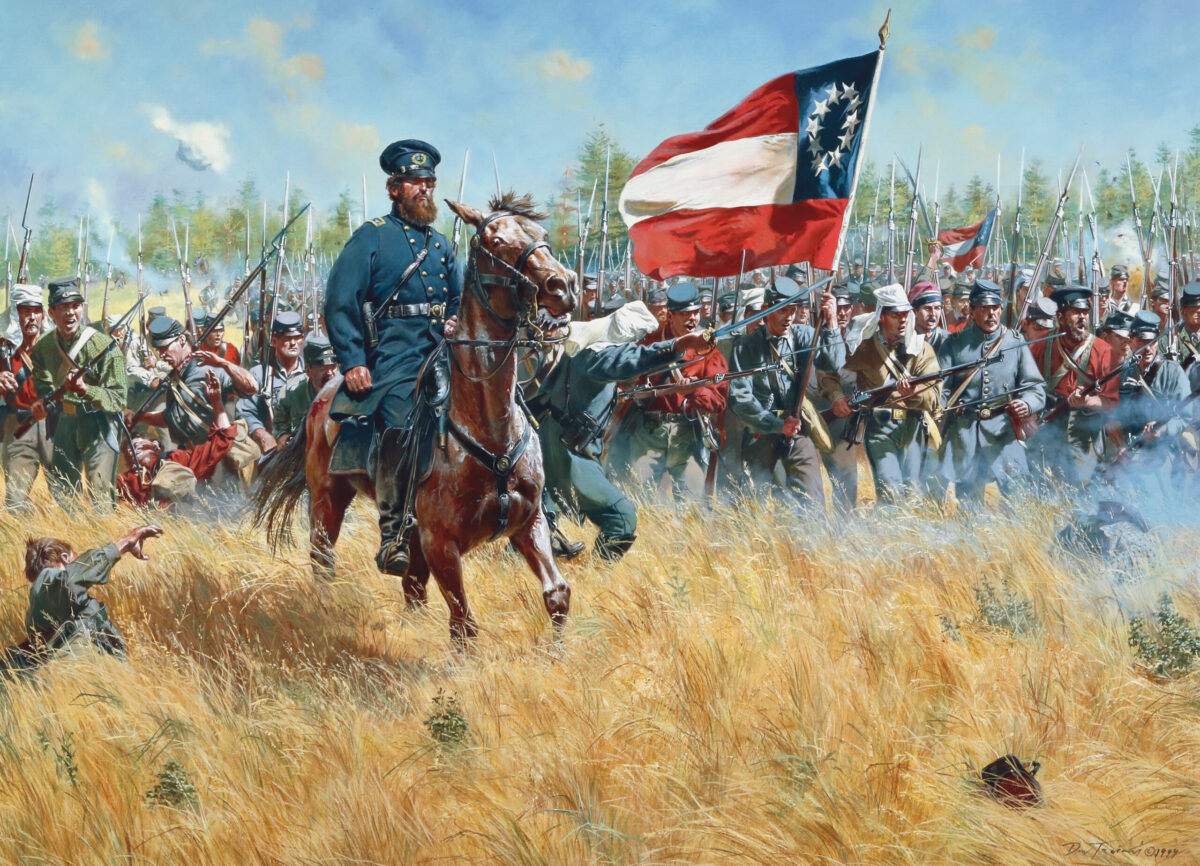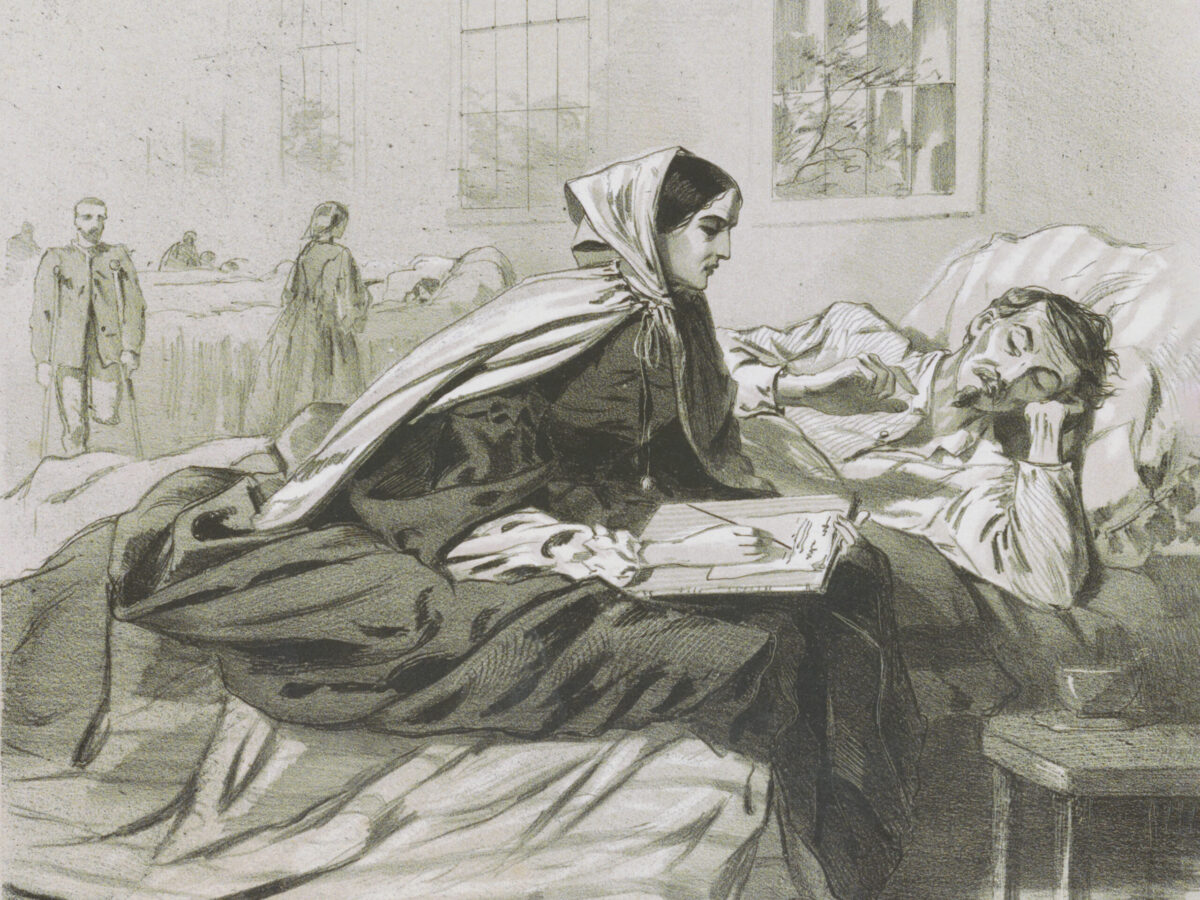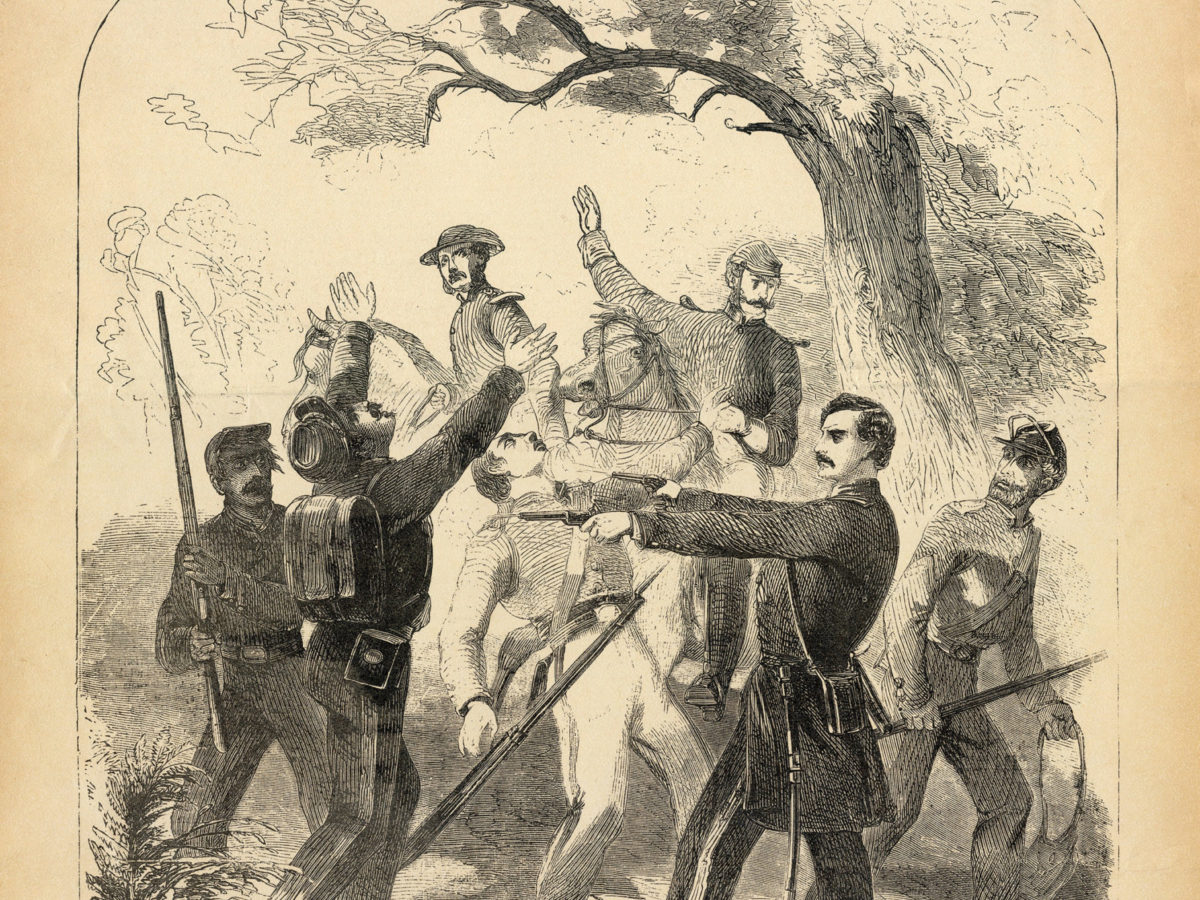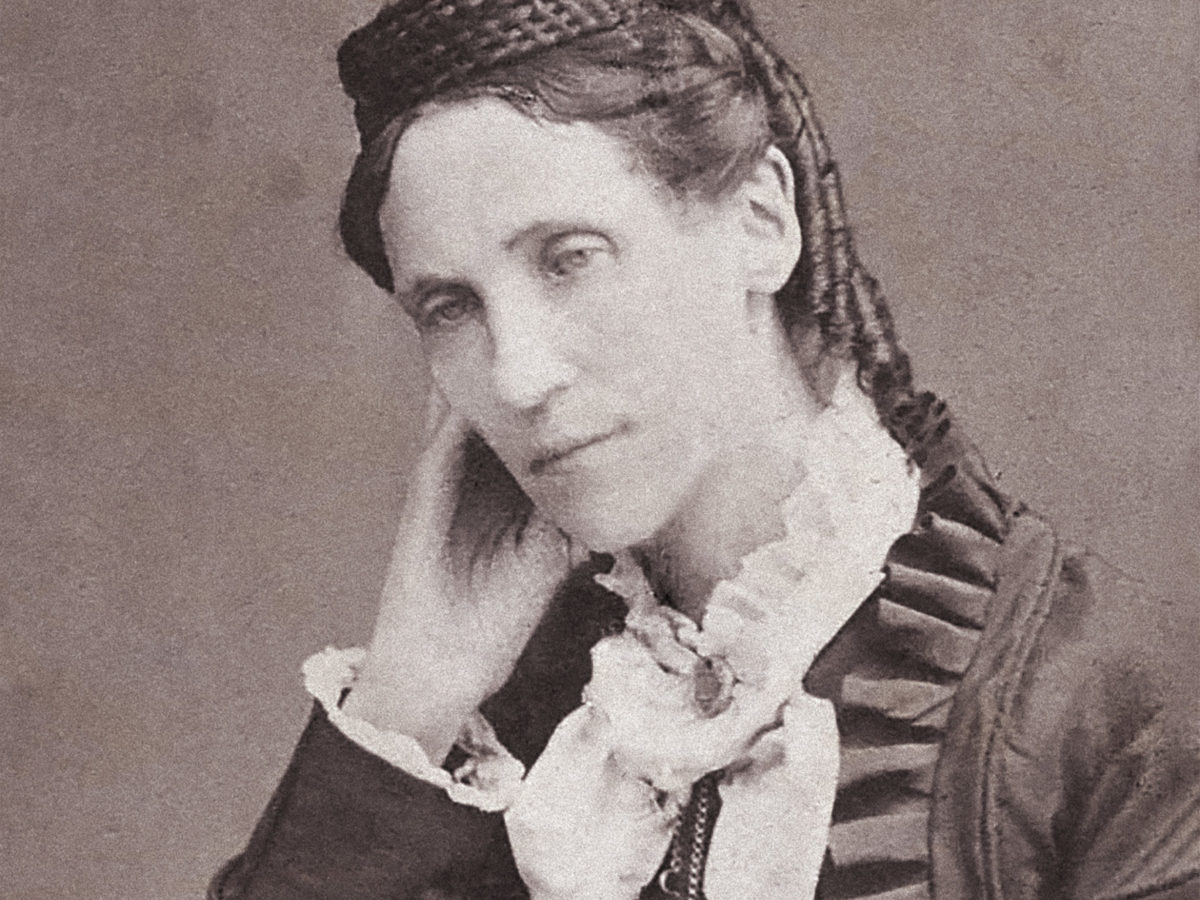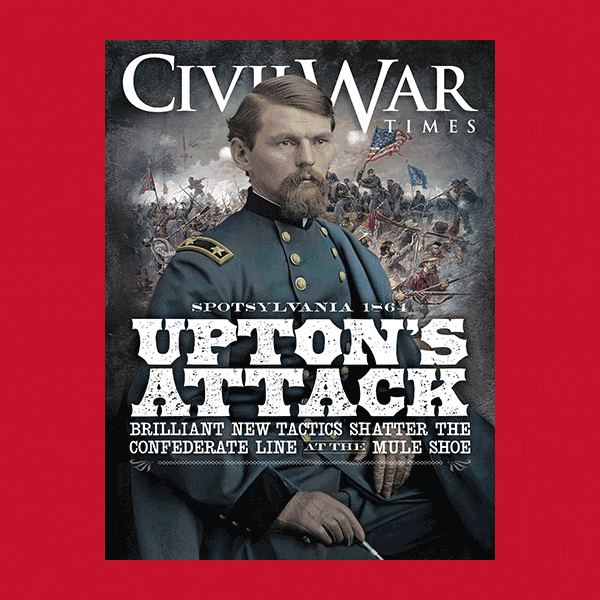The opposing forces that met on the plains of Manassas, Va., on July 21, 1861, had much in common, particularly their lack of experience with the realities of armed conflict. While a few veterans of frontier, Mexican, and foreign conflicts were present, by and large these men were about to get their first glimpse of “The Elephant” of war. After the battle, many set their thoughts down on paper to share with friends and family at home. These fell on a spectrum from vague to specific, from caustic to introspective. Some focused on their immediate experience alone, some on that of their comrades, and some expanded to consideration of what it all meant in a moral or national sense. Following are four examples from inexperienced Confederates who fought on different areas of the field that day.
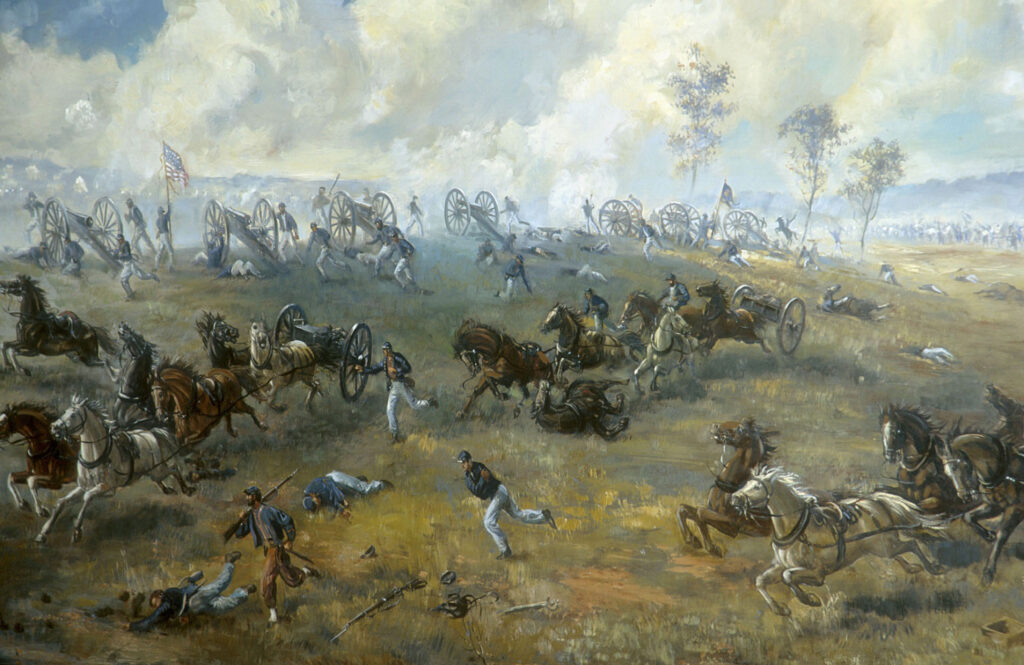
Green Berry Samuels
Private Green Berry Samuels was 21-year-old private in the Muhlenberg Rifles (10th Virginia Infantry, Company F). Part of a prominent family from the town of Woodstock in Shenandoah County—his father was a lawyer, judge, and former member of the U.S. Congress—he had been educated at the University of Virginia. At Manassas, his regiment was part of Arnold Elzey’s Brigade in the Army of the Shenandoah, fighting on Chinn Ridge. Five days later, he described his first battle experience in a letter to his sister from nearby Fairfax Station.
…Colonel Elzey’s brigade of which I have the honor of being a member left Piedmont on the Manassas cars early in the morning and after landing at the Junction we ran some 5 miles to the field of battle and arrived just in time to change defeat into a glorious victory. We sustained 5 volleys of musketry within the small loss of 6 killed and 14 wounded in our regiment. The ground sheltered us and connected with our throwing ourselves flat on the ground no doubt saved many a gallant soldier’s life. I cannot describe my feelings as I came into battle and heard the shrill singing of the rifle cannon shell and the whistling of the Minnie balls. I was not afraid and I am proud to say that I think none in the company were frightened although many a pulse beat faster at the sight of death and the sound of the death dealing balls….
The hardest trial to one’s nerves is the sight of the wounded and the dead; in many cases the agony of the wounded was awful and their pitying cries for water heart-rending. As for the dead, some had died with their hands folded across their breasts with their eyes wide open looking up to Heaven with a sweet smile upon the face, some had evidently died in awful agony, with distorted faces, glaring eyes and clenched hands. I will write no more of this awful scene; it makes me sick to think of it. Would to God, Lincoln could have seen the horrors of last Sunday; we would have peace today instead of war. Our county, I understand, has lost some 20 killed, which has carried mourning into many a now fatherless home. Poor Milton Moore was engaged to be married; what must be the feelings of the young lady?…
…I will send you a photograph of Colonel Ellsworth taken on the field of battle, please keep it safely as it will be a reminiscence for me in my old age should I live. Do not fail to keep it safely….
Samuels was captured twice during the war, and rose to a lieutenancy. For a time he served as an aide to Brig. Gen. Raleigh Colston. After the war he was a lawyer, and died in the soldier’s home in Richmond in 1901.
Charles Woodward Hutson
Private Charles Woodward Hutson of the Washington Light Infantry, Company A (Hampton’s Legion) was 20 years old at the time of the battle. He was from McPhersonville, S.C., and educated at what today is the University of South Carolina. His father, William Ferguson Hutson, helped draft the South Carolina Ordinance of Secession. The day after the battle, he wrote to his parents, from the University of Virginia in Charlottesville, where he was recovering from his wound. Hutson’s letter also gives his impression of how his companions behaved in action, and great detail of his wounding.
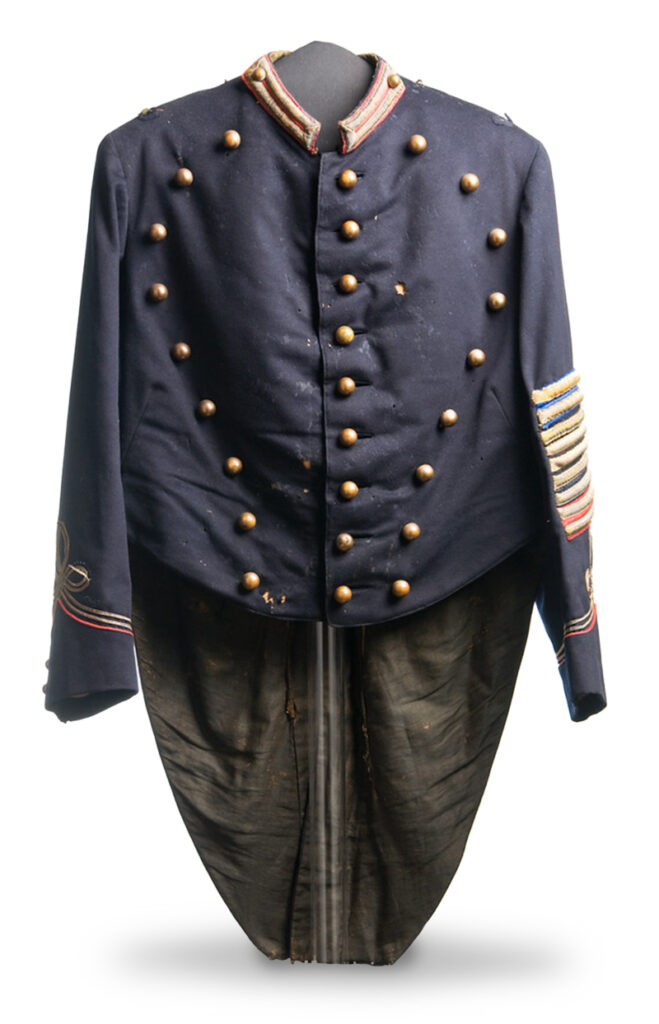
…Never have I conceived of such a continuous, rushing hailstorm of shot, shell & musketry as fell around & among us for hours together. We, who escaped, are constantly wondering how we could possibly have come out of the action alive. The words I used just now; “we, who escaped”, have a sad, sad sound to us; for we know not yet who are to be included in that category, & are filled with terrible anxieties as to the fate of dear friends. I must trace now to you my own course through the action, which I can or ought to do clearly enough, since, I was cool & confident from first to last, knowing where my trust was placed, that no real harm could befal me & that there was a duty before me which I must perform at every hazard. All of our men behaved gallantly, though few were free from excitement….I entreated the Captain to let me advance alone near enough to the ranks of those who were firing upon us to ascertain whether they were Federals or Confederate. But the Captain would not consent, & wished to go himself; this, however, Col. Hampton would not permit. Seeing, I could do nothing there, I attempted to persuade our men not to dodge, satisfied that we could never keep orderly ranks as long as the men persisted in dodging. But all my efforts in this line were unavailing; the men were fearless, & advanced undauntedly enough; but, I suppose, they thought dodging was a “help”, anyhow, to escape from the balls. Iredell Jones, & the officers kept erect; & neither they nor I were any the worse for it….I was the first who fell. I had put on my spectacles, taken good aim & fired my first shot. As I was in the act of re-loading, a rifle-ball struck me in the head, a little above the forehead; & the violence of the concussion felled me to the earth immediately. I drew off my spectacles & flung them aside; & not believing my wound a bad one, as it was not painful, I attempted to reload. But the blood was gushing over my face & blinding my eyes; & I found it impossible to do so. I knew pretty well the extent of my wound, as I had probed it with my finger as I fell; & as the gash seemed to be a deep one, I feared faintness would ensue from loss of blood, especially as there was a large puddle of it where I first lay. So, I put aside my gun for a while, & put my white handkerchief inside my hat upon the wound & tied my silk one around the hat. By the time I had finished these precautions, the company were in retreat; & with Jones & a few others I made my way to the clump of trees, whence we had advanced. Here protected by the trees & squatted down, these few detached from the company continued the fire. Jones having given me some water from his canteen, & my eye being by this time wiped pretty dry of the blood, I again attempted to re-load. But before I could do so, a ball from the enemy shattered my rifle to pieces. I now made the best of my way to the shelter of the house on the hill, the shell & shot of the enemy ploughing up the ground at every step I took, & the musketry rattling like hail around me. I lay behind the house quite exhausted, & much pained by the sight of some of my comrades badly wounded. Dr. Taylor examined my wound here, & charged me to use all my strength to reach the Hospital…
Hutson led a remarkable postwar life. He was admitted to the bar, but eschewing the practice he taught throughout the South, including at the University of Mississippi, Louisiana State University, and Texas A&M. His subjects included Greek, metaphysics, moral philosophy, history, and modern languages. He also authored numerous books on civilization and languages. After his teaching career ended, he settled in New Orleans and took up painting. Though his trained artist daughter offered to teach him the basics, he insisted on an amateur’s approach. In 1917, at the age of 77, his works were first shown publicly, in New York City. His first one-man show came in 1931, at 91. He gained a solid national reputation, though his landscape artwork is hard to categorize. He lived to be 95.
John Pelham
The son of an Alabama physician/planter, John Pelham resigned from the U.S. Military Academy on April 22, 1861, just two weeks before his pending graduation. The 22-year-old lieutenant arrived at Manassas with elements of Joe Johnston’s Army of the Shenandoah the night before the battle, and found himself in command of four six-pounder guns of the Wise Artillery due to the absence of its captain. Two days after the battle, he wrestled with his conflicting emotions, shared his surprising introspection, and rationalized the necessity of his actions in a letter to his father at home in Alabama, which was published in the August 8 edition of the Jacksonville Republican.
I just write to let you know that we have had one of the most desperate battles ever fought on American soil. It was the most desperate—the enemy fought long and well, but victory is ours, it was a splendid victory too. Jeff Davis made his appearance on the field, just as the last of the Yankees were in full retreat. I was under a heavy fire of musketry and cannon for about seven hours, how I escaped or why I was spared a just God only knows. Rifle balls fell like hail around me. Shells bursted and scattered their fragments through my Battery—my horse was shot under me, but did not give out till the fight was almost over. I was compelled to take one of my Sergeant’s horses and ride through. At one time I dismounted and directed the guns—one of the gunners asked me to dismount and shoot the Federals flag down. I did so—you ought to have heard the cheers they gave me. I directed all my guns three or four times apiece. My men were cool and brave and made terrible havoc on the enemy. They fought better than I expected they would. The highest praise is due them….I was complimented several times on the field of battle by general officers and a great many times after the battle was over by other officers, you may want to know my feelings—I felt as cool and deliberate under the shower of lead and iron as if I had been at home by our fireside—I did not feel fear at any moment; I can’t see how I escaped—a merciful Providence must have been watching over us and our cause.…
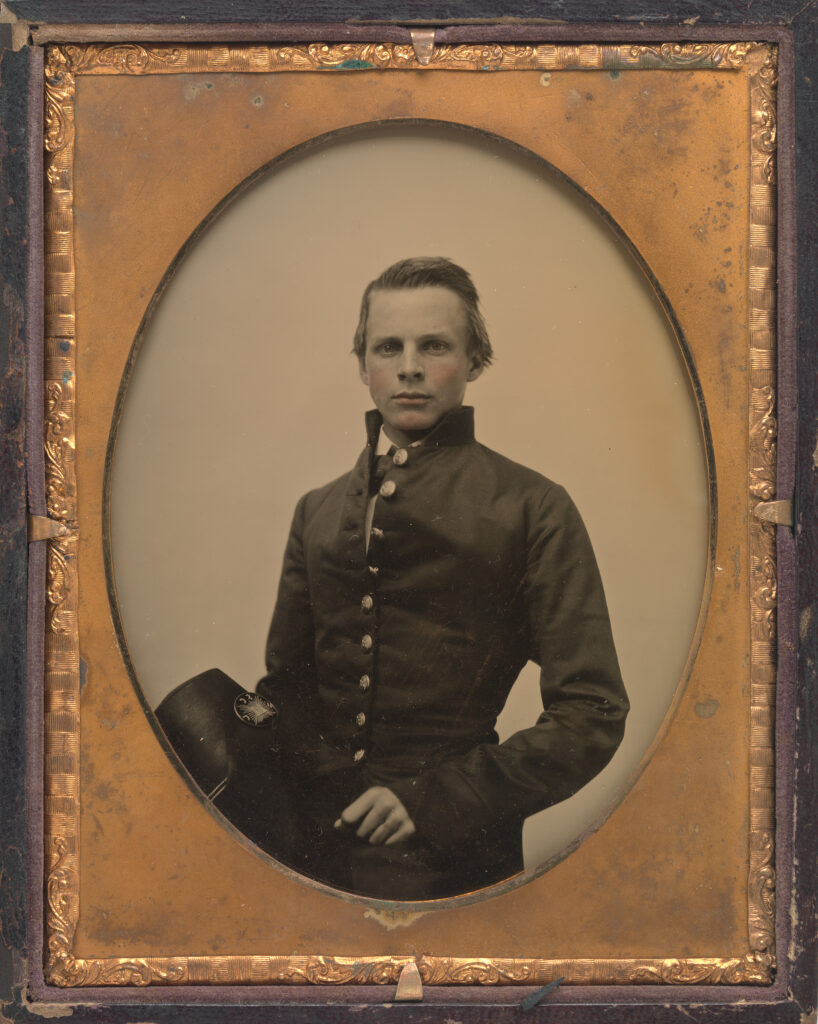
I have seen what Romancers call glorious war. I have seen it in all its phases. I have heard the booming booming of cannon, and the more deadly rattle of musketry at a distance—I have heard it all near by and have been under its destructive showers. I have seen men and horses fall thick and fast around me. I have seen our own men bloody and frightened flying before the enemy—I have seen them bravely charge the enemy’s lines and heard the shout of triumph as they carried the position, I have heard the agonizing shrieks of the wounded and dying—I have passed over the battle field and seen the mangled forms of men and horses in frightful abundance—men without heads, without arms, and others without legs. All this I have witnessed and more, till my heart sickens; and war is not glorious as novelists would have us believe. It is only when we are in the heat and flush of battle that it is fascinating and interesting. It is only then that we enjoy it. When we forget ourselves and revel in the destruction we are dealing around us. I am now ashamed of the feelings I had in those hours of danger. The whistling of bullets and shells was music to me, I gloried in it—it delighted and fascinated me—I feared not death in any form; but when the battle was won and I visited the field a change came over me, I see the horrors of war, but it is necessary. We are battling for our rights and our homes. Ours is a just war, a holy cause. The invader must meet the fate he deserves and we must meet him as becomes us, as becomes men. As President Davis said, several months ago, “a small mound of earth marks the place where the invader fell.”
After First Manassas, John Pelham rose to fame as the commander of J.E.B. Stuart’s horse artillery. He was mortally wounded at the Battle of Kelly’s Ford on St. Patrick’s Day, 1863, and died the next day.
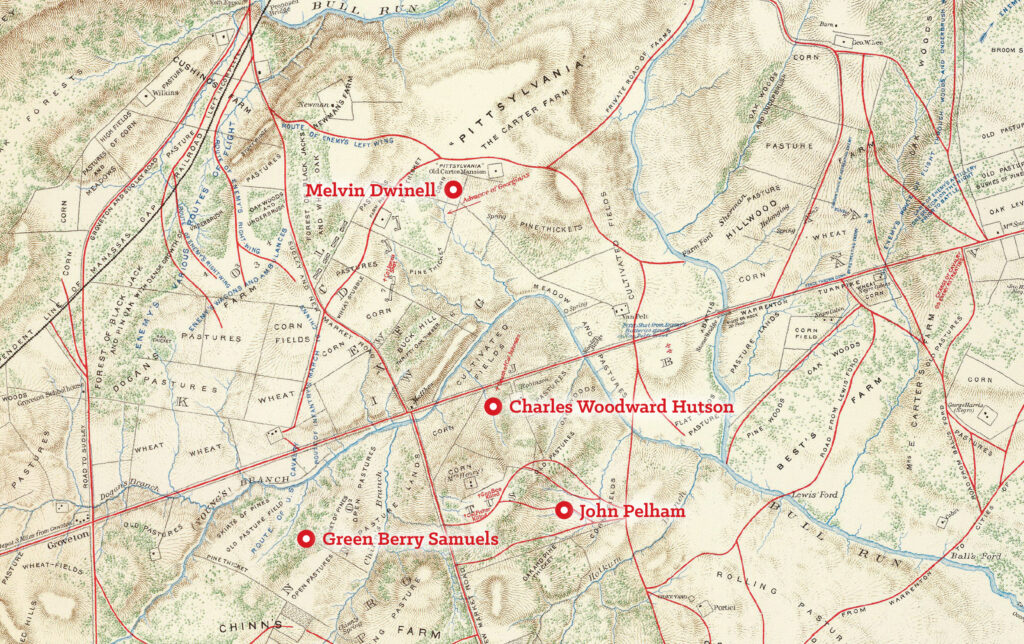
Melvin Dwinell
Melvin Dwinell was born in Vermont in 1825, but in 1853 he made his way south to Georgia. Three years later, he became editor and owner of a paper that by 1861 was known as the Rome Tri-Weekly Courier, At the time of the First Battle of Manassas, he was a 36-year-old lieutenant of the 8th Georgia Infantry’s Company A, known as the Rome Light Guards. The regiment was involved in heavy fighting on Matthews Hill during the opening phase of the battle and, by Dwinell’s count, 38 percent of its 543 men engaged in the fight were killed, wounded, or captured. He corresponded regularly with his paper throughout the war. The following, written on August 13, 1861, from Camp Bartow near the battlefield, appeared in the paper 11 days later, and is exceptional in its length and its focus almost solely on Dwinell’s feelings while under fire and his reaction to the attendant carnage.
As everything in the way of news, incidents, accidents, &c., pertaining to the great battle of the 21st, is eagerly sought for by all who have relatives or friends in the Confederate Army, and as this includes nearly every family member in the country, the writer of this is so presumptuous as to undertake “a description of one’s feelings in the battle of Manassas–it being his first experience.”
More Firsthand Accounts
Though at different times and places our Regiment had been, some six or eight times, drawn up in line of battle, and we had gone through all the little heart sinkings, trepidations and fearful apprehensions, which most men experience, upon the eve of entering the life and death contest, yet, when we knew that a great battle was about to be commenced, yet there was such a deep and thrilling earnestness in the cannon’s first booming, as convinced us of the certainty of the fearful work about to be done, and a deep seated apprehension of danger—though not generally shown by palid cheeks or trembling limbs—was experienced. The certainty of danger became still more apparent, when coming near the range of one of the enemy’s batteries, we heard the whizzing of the death dealing missiles, as they passed with a horrid significance of what we might expect from better aim.
The “pomp and circumstance of glorious war” suddenly dwindled down to the severest kind of plain, common sense, and it very soon became apparent, that common sense rules must be the basis of all discreet actions. At the first sight of the enemy, all the bug bear delusions that may have existed in the fancy of any one, as to their appearance, were suddenly dispelled, and they looked at the distance of three hundred or four hundred yards, precisely like so many of our men.
Quite different from all my fancies of great battles; this was not fought in a broad open field, where the two grand armies could be drawn up in long, unbroken lines, and approach each other in heavy columns. There is no considerable extent of right level ground on this memorable field, but is completely broken with hills and dales, meandering branches and protecting groves. And in extent, the hottest part of the battle field was about one miles by three quarters in width. On such a field, of course, the awful grandeur of appearance of the approaching armies was lost. Then when the firing commenced, that wonderful, indefinite and superhuman grandeur of movements, that my imagination had painted, all faded out, and in its place I had an ugly, dusty, fatiguing and laborious realization of the actual in battle. I experienced most fear when the first cannon ball passed over, with a tremendous whizzing, about twenty yards off; and felt the most dread apprehension, when ordered immediately after, to take a position on a little eminence, in fearful proximity to the place the ball had just passed. After our Regiment had moved forward some 200 or 300 yards, we again came both in range and sight of Sherman’s celebrated Battery, about three-fourths of a mile from us. Their shell and balls came fearfully near, and as one passed through an apple tree just over my head, a cold chill ran over me, and I suffered from agonizing fear, for probably, three or four seconds, but after this, during the entire battle, though I was in almost constant expectation of being killed, yet there was no painful realization of fear, such as would make one hesitate to go wherever duty called, or prevented a full and free exercise of all the faculties of body and mind. As the dangers really increased, and friends were seen falling thick upon either side, the apprehension, or rather the fear, of them became strangely less, and without feeling secure there was a sort of forced resignation to calmly abide whatever consequences should come.
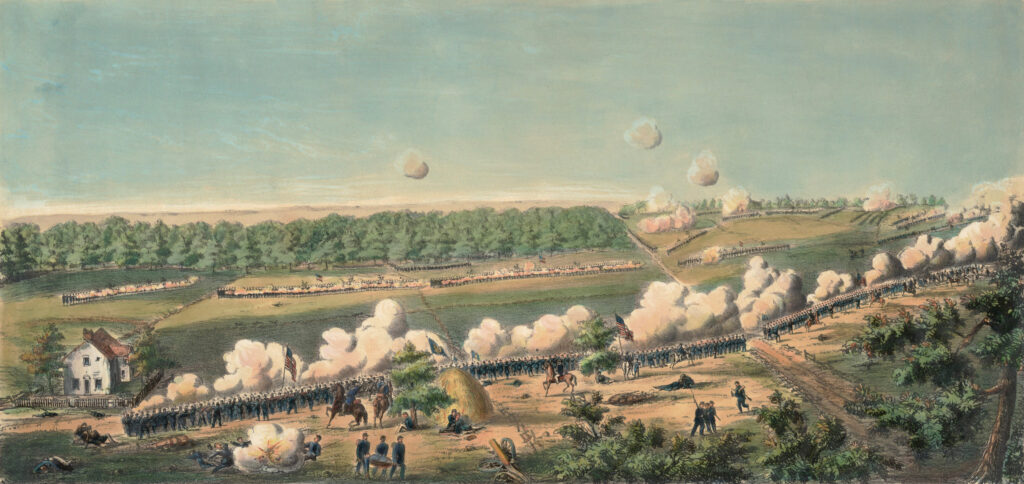
At no time did I experience any feeling of anger, or discover any exhibition of it in others. A stern determination and inflexible purpose, was the predominant expression of countenance of all, so far as my observation extended, and any sudden exhibition of passion would have seemed ridiculous.
One of the most remarkable mental phenomena, was the sudden and strange drying up of sympathetic feeling for the suffering of the wounded and dying. I could never before look upon even small operations, or persons in extreme pain from any cause, especially when blood was freely flowing, without intense pain and generally more or less faintness. But on this occasion I beheld the most terrible mutilations, the most horrid and ghastly expression of men in the death struggle, men with one arm or a leg, shot off, others with the face horribly mutilated, heads shot through and brains lying about, bodies half torn into, and at the hospital, some 50 men with legs or arms jut amputated and a half cord of legs and arms, and men in all degrees of pain, from the slight flesh wound to those producing death in a few moments, and viewed all this with far less feeling that I would ordinarily have seen brutes thus mutilated. This obduracy I am truly glad, was only temporary. Only two days after the battle I caught myself avoiding the amputation of an arm.
I have written thus much of my own feelings, not because they were peculiar, but according to my best knowledge and belief, were nearly the same as those shared by a great majority of all those who were in the heat of battle, for the first time, on the “glorious 21st.”
Melvin Dwinell was wounded at Gettysburg on July 2, 1863. He remained on wounded furlough until his resignation in November 1863. He represented Rome in the Georgia Legislature until the end of the war and continued to publish the Courier until selling it in 1885. He died two years later, at 62. His wartime correspondence with the Rome Tri-Weekly Courier can be found in “Dear Courier”: The Civil War Correspondence of Editor Melvin Dwinell, edited by Ford Risley.
The above are fairly representative of surviving letters so far as the writers’ self-reported composure under fire and the horrific nature of combat. In the case of their composure, the self-serving nature of letters home renders it difficult to determine if what they wrote is an accurate reflection. Those who felt less than cool or detached or unafraid may have been reluctant to record their lack of equipoise, either out of consideration for themselves or for the concerns of those at home. Some few recollections are less “heroic”: one Virginian recalled, “Not being a warrior but a plain citizen, I saw nothing especially entertaining in such a hubbub….We lay as flat as flounders.”
These few hours of fighting, suffering, and surviving forever changed the men who fought at Manassas. The extent of that change is certainly a factor of the contrast between what they experienced there and the relatively peaceful antebellum lives they led. How their world views would continue to change over the next four years, only time would tell.
These and hundreds of other letters, diaries, memoirs, testimonies, and reports associated with the First Battle of Manassas can be found at Harry Smeltzer’s website, www.bullrunnings.wordpress.com.

